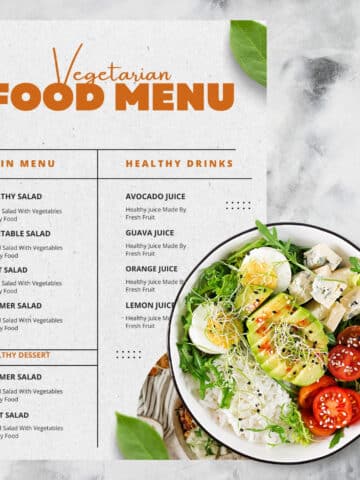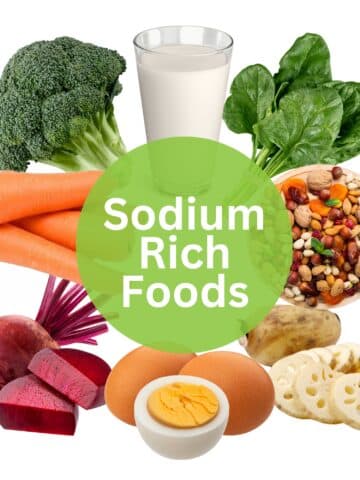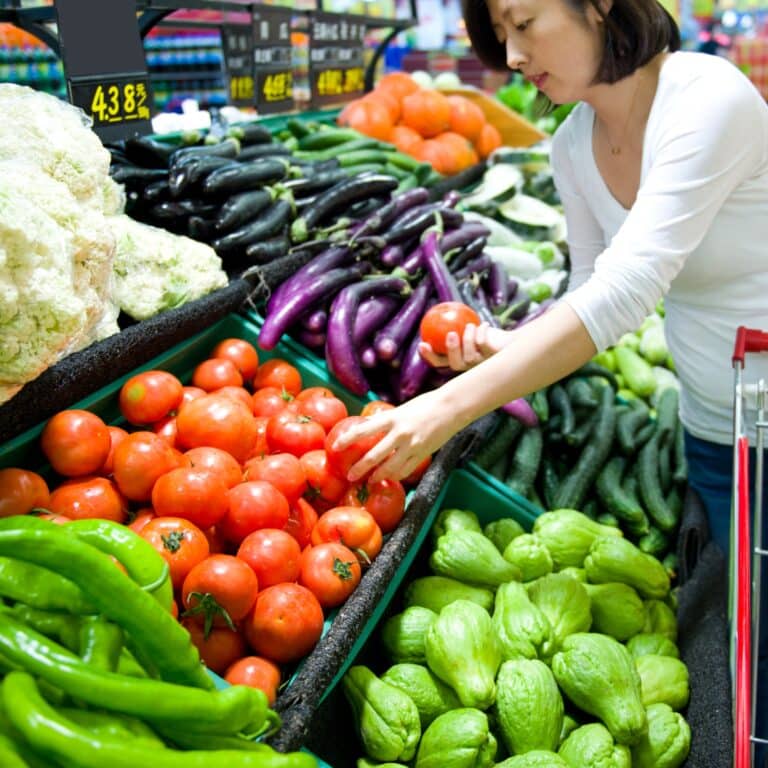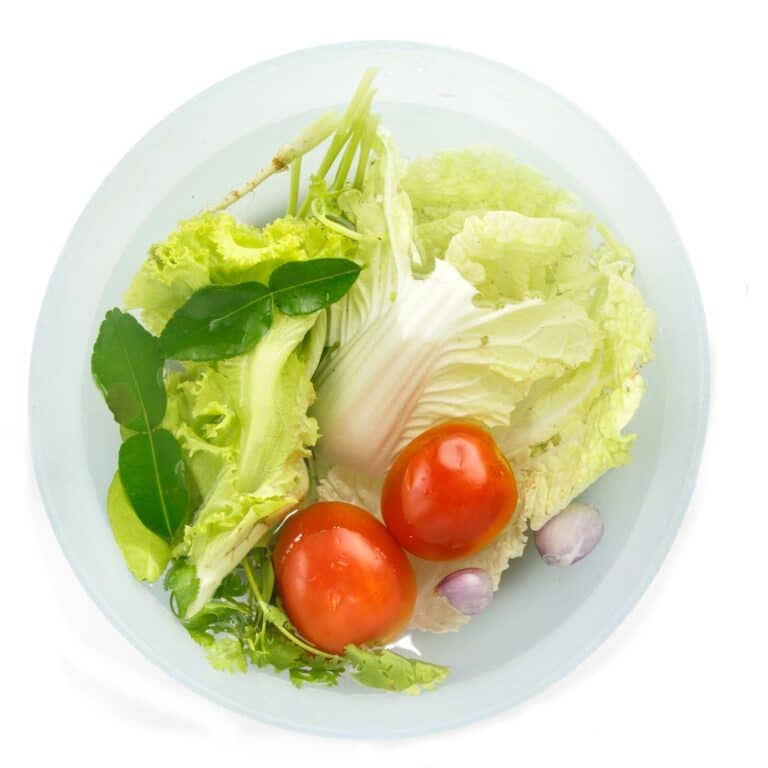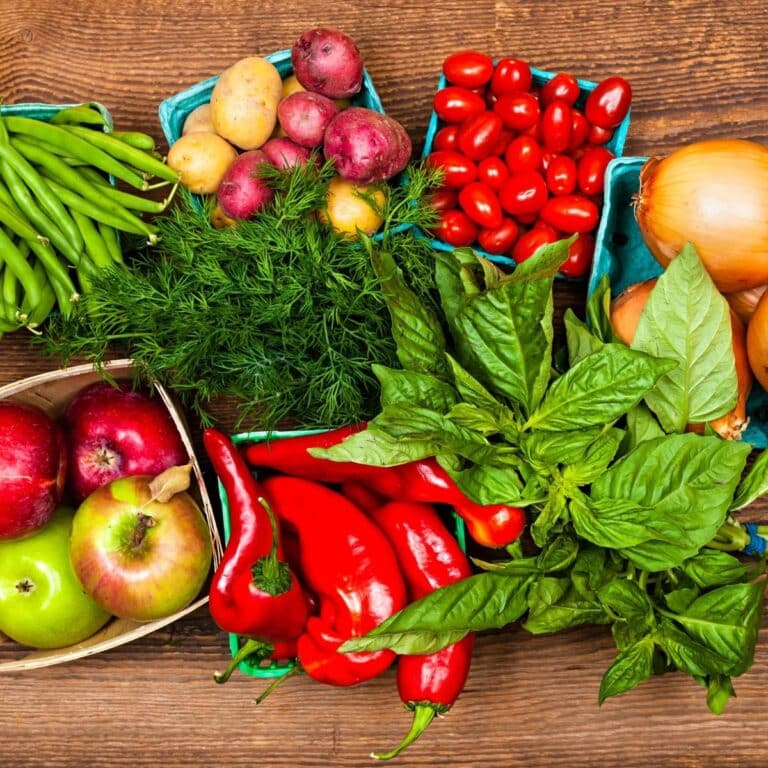Fruits For Dialysis Patients
Navigating the world of dialysis can feel like trekking through a dense forest. You're not alone. This guide will light your path, showing you how to incorporate low-potassium and low-phosphorus fruits into your diet as you deal with Chronic Kidney Disease.
You'll learn to prepare fruit for dialysis patients, sidestep common mistakes, and ultimately make choices that nourish your body and spirit.

Let's embark on this journey together, ensuring you get the nutrition you need without compromising your dialysis treatment for people with kidney disease.
Jump to:
- Key Takeaways
- Understanding Dialysis and Diet
- Importance of Low Potassium Fruits
- Best Low Potassium Fruits
- Importance of Low Phosphorus Fruits
- Top Low Phosphorus Fruits
- Integrating Fruits Into a Dialysis Diet
- Preparing Fruit for Dialysis Patients
- Mistakes to Avoid When Choosing Fruits
- FAQs for Fruits for Dialysis Patients
- Options for Fruits For Dialysis Patients
Key Takeaways
- Dialysis patients require a high protein diet
- Selecting low potassium fruits is essential
- Low-potassium fruits offer essential vitamins and hydration benefits
- Choose fresh fruits over canned ones to limit sodium intake
For More Recipes and Ideas --->> Get Your Free Meals and Recipes That Are Perfect for Pre-Dialysis Diets, Pre-Dialysis with Diabetes, or Dialysis Diets.
Understanding Dialysis and Diet
You need to understand that dialysis can significantly impact your nutritional needs. It's not just about what you eat, but also about how your body processes and uses nutrients.
Let's discuss the dietary restrictions that are often recommended for patients on dialysis and why these restrictions are necessary for maintaining your health.
Dialysis Impact on Nutrition
When you're on dialysis, it's crucial to understand that this process can significantly alter your nutritional needs. Dialysis nutrient loss, dialysis-induced malnutrition, and dehydration are all potential risks. Here are four things you need to know:
- Dialysis Nutrient Loss: Dialysis can lead to substantial loss of vital nutrients. This can further lead to deficiencies which you should compensate for in your diet.
- Compensating Nutritional Deficiencies: Eat nutrient-dense foods like fruits to make up for the loss.
- Dialysis and Dehydration: Dialysis can cause dehydration. Ensure you are hydrating adequately.
- High Protein Requirement: Dialysis patients require a high protein diet to prevent malnutrition.
Dietary Restrictions Explained
As a dialysis patient, it's crucial to understand that several dietary restrictions must be followed to ensure your health and wellbeing. Dietary compliance challenges may arise, but it's important to balance your protein requirement with the intake of iron-rich foods.
The significance of these foods lies in their ability to aid in the production of red blood cells, which are often depleted during dialysis.
Being mindful of sodium intake considerations is also key, as excess sodium can increase thirst and lead to fluid overload. This brings us to the importance of fluid restrictions. Too much fluid can strain your heart and increase blood pressure.
Getting the right nutrition for people is super important! As you follow a kidney-friendly eating plan and stay at a healthy weight.
Importance of Low Potassium Fruits
You need to understand the critical role of low potassium fruits in a dialysis patient's diet. High potassium levels can cause serious health problems, so selecting fruits with lower potassium content is essential.
In the next section, we'll identify some of these fruits and discuss how proper potassium regulation is achieved during dialysis.
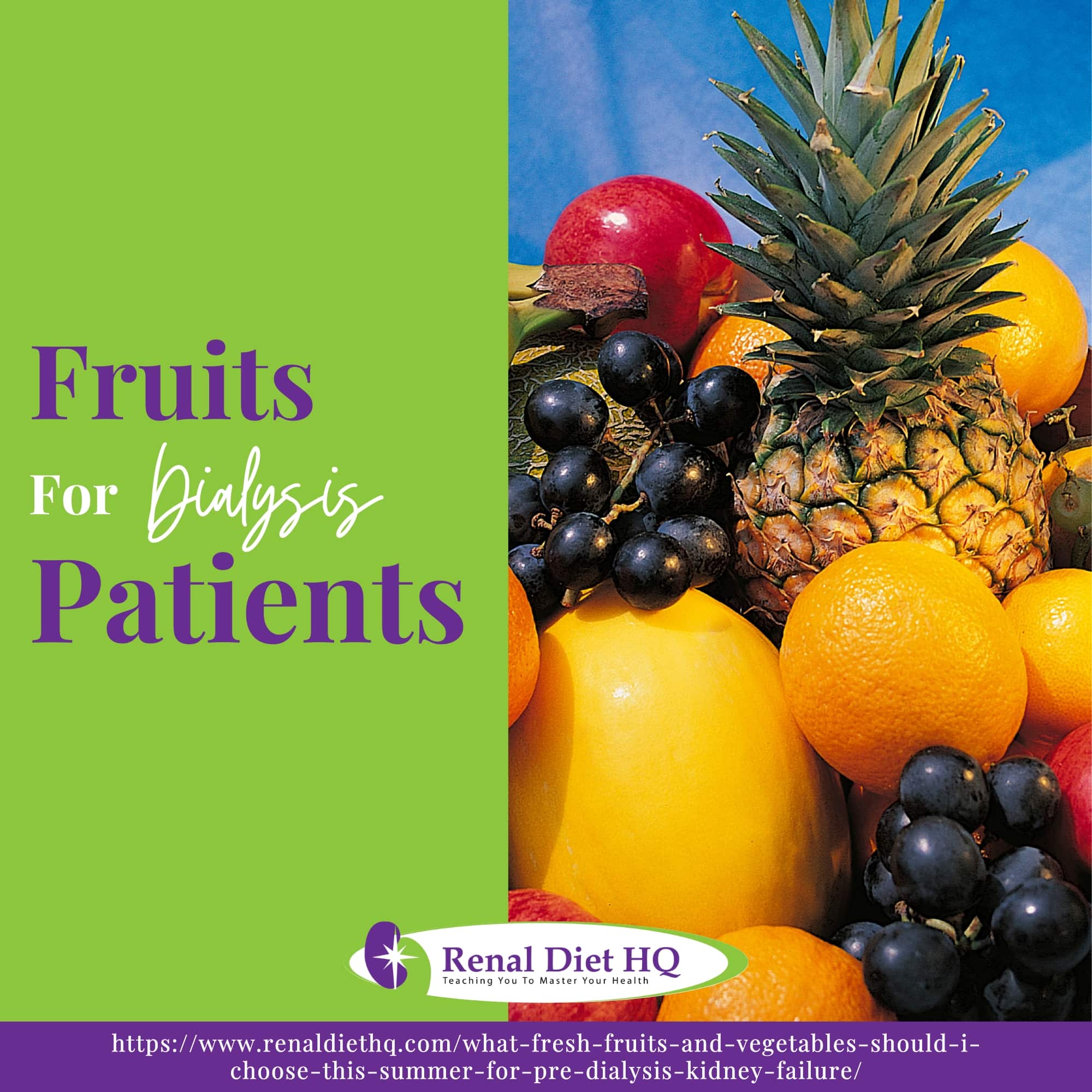
Potassium Regulation in Dialysis
The importance of maintaining a low potassium diet becomes clear as it's crucial for your body's regulation during dialysis. Kidney function is impaired when potassium balance is off, leading to potential dialysis complications. Patient education on potassium sources is key.
Here's a list to help you understand better:
- Kidney Function: Your kidneys are responsible for maintaining the right potassium levels in your body. When they're not working properly, levels can get dangerously high.
- Potassium Balance: Keeping your potassium balance helps maintain heart rhythm and nerve function.
- Dialysis Complications: High potassium can cause heart problems and even sudden death during dialysis.
- Potassium Sources: Fruits, vegetables, dairy, and meat all contain potassium. Opt for low potassium fruits to help keep levels in check.
Identifying Low-Potassium Fruits
In managing your potassium levels, it's crucial to identify which fruits are low in potassium and understand their importance in your diet. Finding kidney-friendly fruit that isn't high-potassium fruit does get easier when you have a table to look at! Check out this list of fruits:
| Fruit | Potassium Content |
|---|---|
| Apple (1 medium) | 159 mg |
| Blueberries (1 cup) | 114 mg |
| Peach (1 medium) | 285 mg |
| Pineapple (1 cup) | 180 mg |
| Strawberries (1 cup) | 254 mg |
Fruit allergies should be considered when selecting which fruits to incorporate. Organic fruits may carry less risk of allergic reactions than non-organic fruits. The Vitamin C content in these fruits also contributes to your overall health.
Diabetic dialysis patients should be mindful of the fruit portion size, as fruits contain natural sugars. Remember, it's not just about selecting low-potassium fruits, but also about maintaining a balanced, nutrient-rich diet. You could even make delicious dishes like a fruit cocktail out of tropical fruits.
Best Low Potassium Fruits
As you navigate your dietary needs as a dialysis patient, it's crucial to focus on low potassium fruits. Identifying these fruits is the first step, and understanding the benefits of their consumption is equally important.
Let's explore the best low potassium fruits and how they can positively impact your health, especially people with kidney disease.
Identifying Low Potassium Fruits
You'll find that several fruits are low in potassium and suitable for your diet as a dialysis patient. Considering potassium absorption rates, fruit peeling benefits, seasonal fruit selection, organic versus conventional, and fruit smoothie considerations, here are some options:
- Apples: High in fiber and low in potassium, they're perfect year-round. Organic apples have fewer pesticides.
- Berries: Strawberries and blueberries offer antioxidant benefits. Seasonality affects their nutrient content.
- Pears: Peeling pears reduces their potassium content, making them a safe choice.
- Pineapples: Ideal for smoothies, but watch out for the potassium in juice form.
Benefits of Consumption
Eating low-potassium fruits like apples, berries, pears, and pineapples doesn't just meet your dietary needs, it also offers a host of health benefits. These antioxidant-rich fruits supply your body with essential vitamins, help maintain hydration, and provide fiber benefits for optimal digestion.
But remember, it's all about the fruit serving sizes. Here's a useful guide to help you:
| Fruit | Serving Size |
|---|---|
| Apple | 1 small |
| Berries | 1 cup |
| Pear | 1 small |
| Pineapple | 1 cup |
These fruits are not only delicious but also pack a powerful nutritional punch. So, next time you're planning a meal, consider adding these low-potassium fruits to your plate. They're a tasty way to take care of your health.
Importance of Low Phosphorus Fruits
You need to understand the importance of identifying low phosphorus fruits in your diet, particularly if you're a dialysis patient. High phosphorus levels in the blood can cause serious health issues like bone disease, heart ailments, and even death.
Therefore, incorporating low phosphorus fruits can't only help maintain your phosphorus levels but also provide other health benefits.
Identifying Low Phosphorus Fruits
When choosing fruits as a dialysis patient, it's crucial to identify those low in phosphorus to maintain your health. Your body struggles with phosphorus excretion challenges, making it difficult to process phosphorus-rich fruits.
- Phosphorus Absorption: High phosphorus fruits can cause harmful buildup in your body due to limited absorption.
- Fruit Intake Guidelines: Select fruits with low phosphorus content, such as apples, berries, and peaches.
- Phosphorus Content Labeling: Always check labels for phosphorus content. Unfortunately, not all fruits are labeled, so arm yourself with knowledge.
- Phosphorus Excretion Challenges: Your kidneys, responsible for phosphorus excretion, may not function effectively.
Understanding these aspects helps you control phosphorus levels and contributes to a healthier life. So, choose your fruits wisely, it's more than just a dietary choice, it's a life choice.
Health Benefits Assessment
Understanding the importance of low phosphorus fruits in your diet can significantly improve your health status. These fruits are packed with antioxidant properties that combat harmful free radicals in your body, thereby reducing your risk of chronic diseases.
The high vitamin content in these fruits, particularly vitamins C and A, plays a crucial role in immune boosting, helping your body fight off infections. With this information, you'll understand why staying away from high-potassium foods is so important.
Moreover, low phosphorus fruits enhance your fiber intake, promoting digestive health and aiding in weight control. They're also known for their hydration benefits, as they're typically high in water content. This is particularly beneficial for dialysis patients, as proper hydration supports kidney function for healthy kidneys.
Top Low Phosphorus Fruits
As you navigate your dietary needs as a dialysis patient, it's crucial to understand which fruits are low in phosphorus. Not only do these fruits present an array of health benefits, but they also help maintain your phosphorus levels.
However, it's equally important to approach this with caution, as overconsumption could lead to adverse effects during any stage of kidney disease.
Identifying Low Phosphorus Fruits
Although you're on dialysis, you can still enjoy a variety of fruits, provided they're low in phosphorus. To help manage your phosphorus absorption, it's essential to understand phosphorus content labeling and determine fruit consumption frequency on the renal diet.
Here's a strategy to identify fruits low in phosphorus:
- Be aware of dietary phosphorus sources. Fruits are generally low in phosphorus, but some contain more than others.
- Develop phosphorus reduction strategies. Opt for portions of fruits like apples, strawberries, or pineapples, which are lower in phosphorus.
- Check phosphorus content labeling. It's important to know the phosphorus content in the fruit you consume.
- Monitor your fruit consumption frequency. Balancing your diet can help maintain healthy phosphorus levels.
Benefits and Precautions
During your journey on dialysis, it's crucial for you to know the benefits and precautions of eating top low phosphorus fruits. Organic selection can help you avoid harmful pesticides, while fruit hydration benefits contribute to maintaining your overall fluid balance. Seasonal fruit benefits include an abundance of vitamins and antioxidants, essential for your well-being.
However, be aware of potential fruit allergies, which can cause uncomfortable reactions. If you have diabetes, monitor your fruit intake, as some can spike your blood sugar levels. Not all fruits are created equal in terms of phosphorus content, so choose wisely.
Always consult your dietitian before making changes to your diet.
Your health journey is important, let's make it fruitful as you embark on this kidney disease diet. Patients with kidney disease have found a lot of success with this food plan.
Integrating Fruits Into a Dialysis Diet
Incorporating fruits into your dialysis diet requires careful selection and adjustments. Opt for low-phosphorus fruits to maintain your nutritional balance post-dialysis.
We'll provide some expert tips for choosing the right fruits tailored to your health needs.
Dietary Adjustments Post-Dialysis
After your dialysis treatment, it's crucial to adjust your diet by integrating specific fruits that won't strain your kidneys but still provide essential vitamins and minerals.
Dialysis-friendly snacks: Opt for fruits such as apples and berries. They're low in potassium and high in fiber, making them perfect for your post-dialysis snack.
Managing fluid intake: Fruits like grapes and watermelons are hydrating but remember to monitor your portion sizes to avoid excess fluid intake.
Protein needs post-dialysis: Add high protein fruits like guavas to your diet. They'll help repair body tissues.
Sodium management tips: Choose fresh fruits over canned ones to limit your sodium intake. This will aid in maintaining a healthy blood pressure.
Fruit Selection Tips
Choosing the right fruits for your dialysis diet requires understanding their nutritional content and how they affect your kidney health. Check for fruit allergies to avoid adverse reactions.
Seasonal fruits are often more nutrient-rich, so try to incorporate them into your diet regularly. When deciding between organic vs non-organic, remember organic fruits might've fewer pesticides but aren't necessarily healthier. Whichever you choose, wash thoroughly before consumption.
Proper fruit storage enhances longevity and taste, so refrigerate berries, grapes, and apples, while storing bananas, pineapples, and citrus fruits at room temperature.
Juicing benefits include easier digestion and nutrient absorption, but beware of high sugar content. Always consult your dietitian for personalized advice about this chronic condition or common conditions that you may deal with while on a kidney-friendly diet. Always seek medical advice from a professional health care provider.
Preparing Fruit for Dialysis Patients
When preparing fruit for a person on dialysis, it's crucial to select dialysis-friendly fruits and use appropriate preparation techniques.
You'll need to ensure the fruits you choose are low in potassium and phosphorus, as these can build up in the blood of those on dialysis.
The way you prepare these fruits can also impact their nutritional content and safety, so it's essential to be mindful of this aspect.
Choosing Dialysis-Friendly Fruits
Let's dive straight into how you can pick out and prepare dialysis-friendly fruits that not only taste great, but also align with your dietary needs.
- Fruit Allergies: Always consider potential allergies, as some fruits may cause reactions. Consult with a doctor or nutritionist to identify safe fruits for your condition.
- Seasonal Availability: Choose fruits in season to ensure freshness and nutritional value.
- Organic vs Non-Organic: Organic fruits are pesticide-free, but they can strain your fruit budgeting. Balance your choice based on health and cost considerations.
- Storage Methods: Proper storage extends fruit life, reducing wast,e and saving money. Refrigerate berries and grapes, but store bananas, tomatoes, and citrus fruits at room temperature.
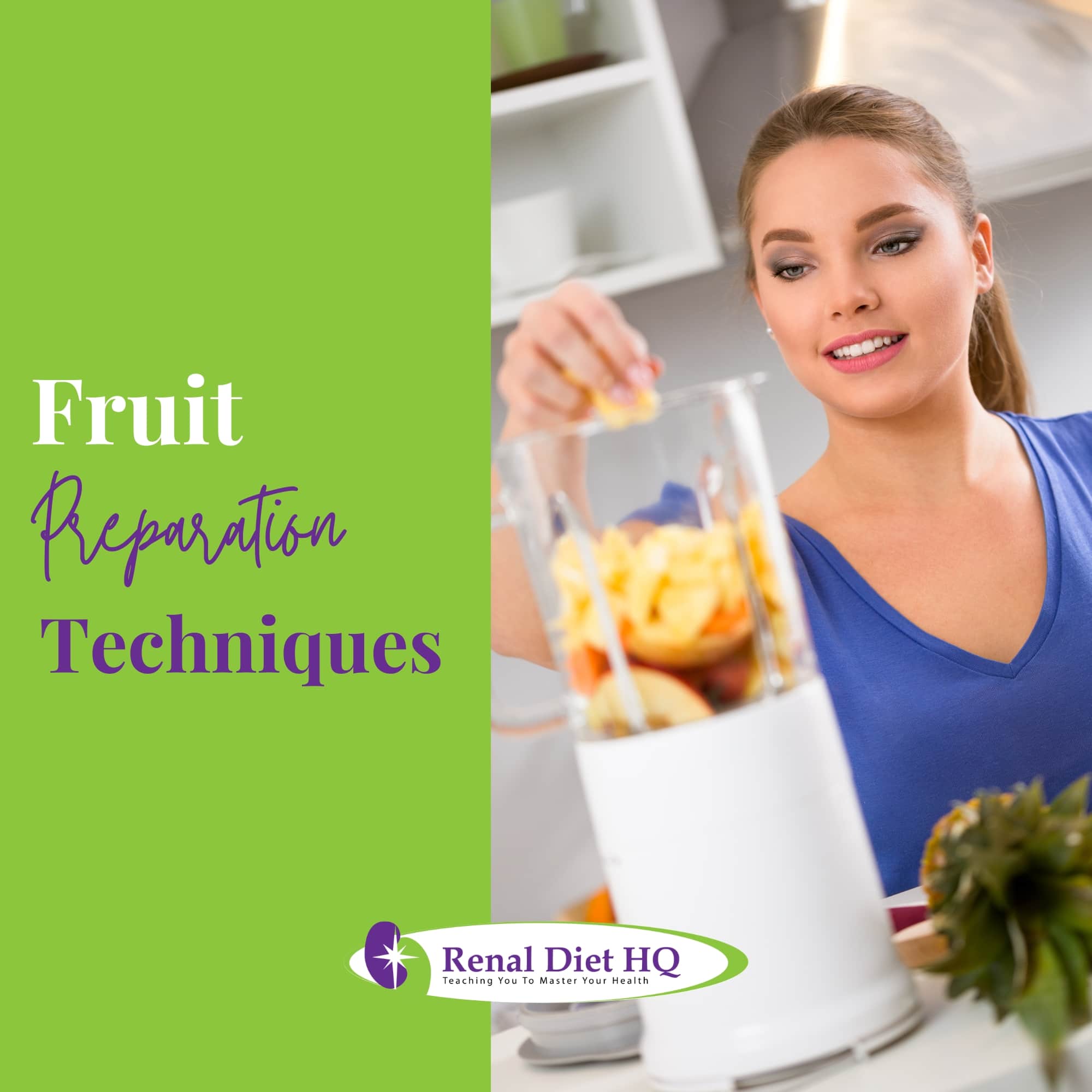
Fruit Preparation Techniques
Now that you've selected your dialysis-friendly fruits, it's time to focus on how you'll prepare them to retain their nutritional value and appeal to your palate.
Start by sanitizing your fruits under running water to remove any potential contaminants. Peeling methods can vary, but for most fruits, a sharp paring knife or peeler will do the trick. This process not only removes the skin but also the outer layer that may have absorbed pesticides.
Proper cutting techniques are crucial for maintaining the fruit's structure and nutritional value. Consider dehydrating fruits to concentrate their flavors and extend their shelf life.
Mistakes to Avoid When Choosing Fruits
Be cautious when selecting fruits as a dialysis patient. Consuming fruits high in potassium can pose risks, as your body struggles to filter out this mineral effectively.
Furthermore, overeating can have severe consequences, even with the most kidney-friendly fruits, so moderation is key.
Potassium-rich Fruits Risk
In your pursuit of a healthier diet, it's crucial to understand that a dialysis patient's selection of fruits should avoid those high in potassium. This is key for potassium absorption control and hyperkalemia prevention strategies as you plan a healthy diet.
- Potassium Overdose Symptoms: Be aware of weakness, fatigue, or abnormal heart rhythms which could indicate high potassium levels.
- Fruit Intake Monitoring: Track your fruit consumption carefully. Fruits like bananas, oranges, and kiwis are high in potassium and should be limited.
- Non Fruit Potassium Sources: Remember, it's not just fruits. Vegetables, dairy, and certain meats can also raise potassium levels.
- Hyperkalemia Prevention Strategies: Regular exercise, a balanced diet, and medication can help manage potassium levels.
Overconsumption Consequences
You might think that all fruits are beneficial for your health, but overconsumption is a healthy topic to discuss, especially of potassium-rich fruits, can lead to serious health complications if you're on dialysis. The overconsumption dangers include imbalances in hydration and sugar levels, and complications with fiber intake and acidic fruits.
Hydration balance is crucial, but too much water from fruits can lead to fluid overload. Overindulging in sweet fruits can spike your sugar levels, making sugar levels management challenging.
Despite fiber's health benefits, excessive intake can cause gastrointestinal issues. Additionally, overeating acidic fruits might cause stomach discomfort and worsen metabolic acidosis as you deal with kidney damage.
| Potential Issue | Fruit to Limit |
|---|---|
| Hydration imbalance | Watermelon |
| Sugar levels spike | Mango |
| Excessive fiber | Avocado |
| Acidic discomfort | Orange |
Choose wisely, moderation is key when incorporating fruits into your diet.
FAQs for Fruits for Dialysis Patients
You should incorporate fruits into your daily diet.
It's key to be mindful of portion control to manage blood sugar levels.
Opt for organic fruits when possible.
Consider seasonal selections for optimal freshness.
Also, the preparation method matters.
Eating fruits raw preserves their nutrients better.
However, you should consult your dietitian for personalized advice as each individual's needs may vary.
Certain fruits may not be your best friends while undergoing dialysis. High potassium levels in bananas, oranges, and kiwis can impact your health negatively.
The way you prepare your fruit also matters. Excessive fiber content can interfere with your medications.
Whether you opt for organic or non-organic fruit, ensure it's washed properly to remove possible contaminants.
Always consult with your healthcare team and/or a renal dietitian to create a fruit-friendly diet plan that fits your needs.
To ensure you're choosing the freshest fruits, follow these fruit selection tips.
. Always opt for seasonal fruit choices. They're not only fresher but also have better nutritional content.
. Look for fruit quality indicators such as vibrant color, firmness, and pleasant aroma.
. Storing fruits properly also extends their freshness.
. Consider organic versus non-organic fruits too. Organic options, while pricier, tend to have fewer pesticides.
. Lastly, always wash fruits thoroughly before eating.
You can enjoy fruit juices, but be mindful of the fruit sugars. They're more concentrated in juice than in whole fruits.
Juice benefits include easy digestion and nutrient absorption. However, juice lacks the pulp, which provides fiber. Also, juice preparation might introduce extra sugars or preservatives.
So, it's best to balance juice consumption with eating whole fruits. It's all about managing your intake while reaping the health benefits.
Always consult with your healthcare provider for personalized advice as you journey through the kidney diet.
Options for Fruits For Dialysis Patients
Choosing the right low-potassium foods and fruits for dialysis patients is like piecing together a complex puzzle. It's crucial to select low potassium and phosphorus fruits, such as apples and berries, to maintain a balanced diet.
You must mindfully integrate these fruits into their meals, prepare them appropriately, and avoid common mistakes in selection.
With careful planning, you can help dialysis patients enjoy fruits while keeping their health at the forefront as you learn more about this health topic.


